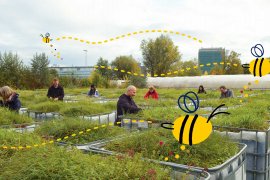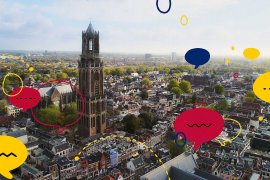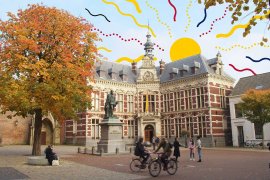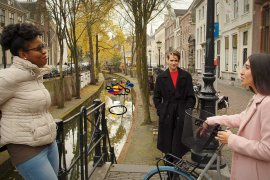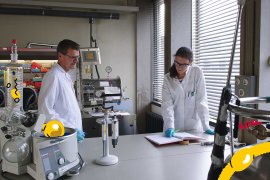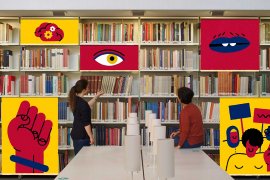Outstanding education
Education at Utrecht University is valuable due to its strong ties to research and its societal impact. Our educational vision is based on a challenging learning environment that does justice to the fact that different students have different ambitions and talents. In the coming period, we will continue our commitment to innovative, flexible and future-proof education of a high quality.
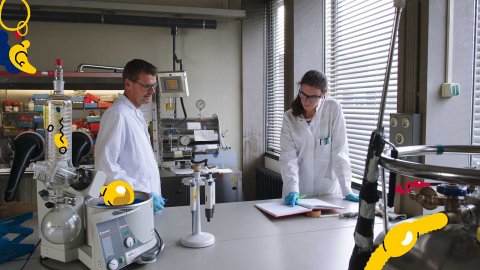
Education for critical global citizens
In today's society, there is a growing demand for individuals with analytical thinking skills and the ability to connect different perspectives. This requires not only specialist knowledge, but also skills such as the capacity to critically evaluate insights and look beyond borders. To familiarise students with these qualities, Utrecht University will take a following step in the development of the Utrecht teaching model in the coming period: from academic success to successful students.
From academic success to successful students.
The guiding principle is to train students to be critical global citizens with an eye for the importance of open society. We offer them opportunities to gain experience in different disciplines and to complete a large portion of the specialisation phase outside their own programme. Students can further expand their individual curricula by filling their free elective space with courses at the strategic alliance partners, Eindhoven University of Technology, Wageningen University & Research and University Medical Center Utrecht. Together with partner universities in Leuven, London, Cape Town, Sydney, Hong Kong and Toronto, we are setting out agendas for the long term.
We want to align our teaching activities with our research profile to a far greater extent than is currently the case. To that end, we are developing an attractive curriculum for all Bachelor's students in which there is room for philosophy, ethics, didactic techniques, issues of academic freedom and integrity and the principles of open society. We will also promote interdisciplinarity in the regular and elective components of the curriculum, with visible inclusion of the strategic themes. Every student will become acquainted with research from the very start of their Bachelor phase. We will integrate the principles of open science into our teaching as well.
Lines of action
- To make room for multidisciplinary education, we plan to thoroughly evaluate the range of disciplinary electives currently on offer in the Bachelor phase.
- The strategic themes of the University's research profile nourish our education; we want these strategic themes to be clearly reflected in our Bachelor's and Master's programmes, as well as in our educational activities aimed at professionals.
- We will work together to explore whether it is possible, and how, to structure a University-wide core curriculum for our Bachelor's programmes.
- We will work with our alliance partners, Eindhoven University of Technology, Wageningen University & Research and University Medical Center Utrecht, to further coordinate the curriculum and increase the jointly offered programmes, including challenge-based education.
- We will actively contribute to the development of the future European agendas for higher education and research. Together with other partners in the CHARM-EU alliance, we will work on multidisciplinary educational innovations including challenged-based education, student-led education and blended learning.
- We will encourage the development of reusable digital teaching material, and work to see that it is centrally stored and made available to others.
In order to provide high-quality education, offering adequate support to lecturers is essential.
In order to provide high-quality education, offering adequate support to lecturers is essential – certainly in periods when lecturers are increasingly affected by excessive workload. This is why we plan to invest in support for lecturers and make educational performance our central focus in the coming period. The Centre for Academic Teaching and Learning, which was established in the previous planning period, will be the central portal for lecturer cooperation, development and support.
Lines of action
- In cooperation with faculty partners, we will optimise the professional development of lecturers, educational innovation and efforts to expand teaching-related knowledge in the Centre for Academic Teaching and Learning.
- We will deploy learning analytics in order to further improve the quality of teaching, student counselling and guidance, and teaching materials. We will reinforce the relevant infrastructure and develop accompanying policy that takes the GDPR, privacy issues and ethical guidelines into account.

Concern for student well-being
The University supports students as they explore and develop their personal and professional identities. A good start, a fitting place and well-being are vital elements in this regard, Utrecht University has established a counselling chain from lecturers to student psychologists. Despite this, the perceived workload of students has increased in recent years, with students experiencing a lack of confidence and a growing pressure to succeed. In the coming planning period, we will therefore continue the activities of the Taskforce Student Wellbeing established in 2018.
Student organisations also contribute to the feeling of community and well-being of students, especially in combination with online education. The University therefore supports a flourishing community of study associations and other student clubs and associations, while cherishing the warm relations with the student organisations.
UU is committed to organising partnerships with universities of applied sciences in order to realise exchange. It should be possible for students to follow courses at different institutions and transfer any credits they have obtained elsewhere without incurring any unnecessary delays to their studies. We are increasing the possibilities for student mobility and encouraging an open community of students.
Lines of action
- We will continue the Student Welfare Task Force, which monitors and advises the Executive Board concerning measures that could prevent excessive workload.
- We will launch an initiative aimed at further reinforcing and harmonising the counselling chain for students (lecturers, tutors, study advisers, student counsellors, student psychologists and confidential counsellors for inappropriate behaviour, Career Services and Skills Lab). The services will remain informal and adequately organised.
- Utrecht University will invest in the possibilities for exchanging course modules with universities of applied sciences, and with HU University of Applied Sciences in particular.
Professional education
In the coming years, Utrecht University intends to continue work on the modularisation of education: evaluation will be more competence-based and more of the teaching will be offered in the form of flexible units. Digital developments and the course offerings of various parties make it possible to assemble an individual curriculum. This gives students greater flexibility to combine their studies with other activities and responsibilities.
Alumni become students for life.
Modularisation also offers opportunities to facilitate education for professionals. Graduates will continue to develop themselves, with alumni becoming students for life. Collaboration with alumni and social and strategic partners will be a two-way street and will generate new knowledge. We will nourish alumni with the latest insights and knowledge (and networks), so that they too can work towards solutions and nourish our University in turn. We wish to provide an innovative and cohesive range of educational options, from Bachelor's degrees to alumni education.
Lines of action
- We will expand the possibilities for flexible education.
- We will offer attractive Education for Professionals programmes, together with HU University of Applied Sciences Utrecht and other regional partners. The education we provide will be connected to the expertise of the faculties (including research expertise) and the strategic themes. The University will support lecturers as they develop new course options.
Social responsibility and entrepreneurship
The University offers students an environment in which they are able to develop their talents to the greatest possible extent, so that, upon graduation, they are able to contribute to resolving the challenges facing society. Such challenges are often complex and defy straightforward solutions. To prepare students for these challenges, they take part in what is known as community-engaged learning during their degree programmes: collaborations with scientists, social partners and private citizens aimed at resolving social issues. This teaches students how theory and practice are connected while at the same time enabling them to make an immediate impact on society. Because an enterprising attitude is an important competence in this regard, we will continue to focus on entrepreneurial education. Initiatives aimed specifically at societal challenges, such as UtrechtInc students, the Utrecht University Social Entrepreneurship Initiative and Dutch Students For Entrepreneurship, contribute to realising this goal.
This teaches students how theory and practice are connected while at the same time enabling them to make an immediate impact on society.
Utrecht University feels a particular responsibility with regard to education in the city and region of Utrecht. Together with the municipality and the educational partners, the University is working on concrete solutions such as fast-track courses, work placements and supervision in schools. In addition, the University wants to spark enthusiasm among students for choosing a career in education. The University wishes to share knowledge and experience with educational partners in the region and thereby contribute to resolving the issue of inequality of opportunity in education.
Lines of action
- Community engaged learning will be permanently integrated into the curriculum.
- We are encouraging the entrepreneurial spirit, innovation and creativity, along with other related skills, among students and employees. We are strengthening the entrepreneurship courses in the existing curriculum.
- Together with HU University of Applied Sciences Utrecht and other educational partners in the city and the region of Utrecht, we are developing an initiative aimed at reducing the shortage of teachers, using each other’s knowledge and courses, the exchange of professionals and advancing accessibility of education and equal opportunities.
- We are exploring possibilities for enabling students to gain teaching skills and earn a Student Teaching Qualification during their degree programme.


